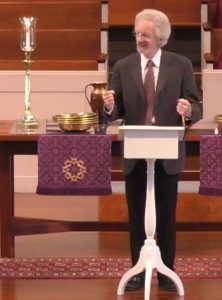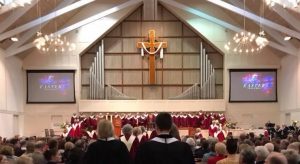 Sitting on the platform as a visiting speaker, I feel as if I have entered a time warp from the late 1950s. I look out on a church sanctuary packed with people dressed in their Sunday finest. These days, pastors where I live in Colorado tend to wear jeans and untucked shirts; here, in a 125-year-old church in a wealthy Philadelphia suburb, they are wearing robes over tailored suits.
Sitting on the platform as a visiting speaker, I feel as if I have entered a time warp from the late 1950s. I look out on a church sanctuary packed with people dressed in their Sunday finest. These days, pastors where I live in Colorado tend to wear jeans and untucked shirts; here, in a 125-year-old church in a wealthy Philadelphia suburb, they are wearing robes over tailored suits.
In advance of my visit the senior pastor sent me a draft copy of the church bulletin, and I noted the organ prelude, Samuel Barber’s Adagio for Strings. I complimented him on the choice, a lyrical piece that has been used in the soundtrack for such movies as Platoon, The Elephant Man, and Lorenzo’s Oil. He wrote back, “Samuel Barber was once the church organist here.” Hearing that, I worked a bit harder on my sermon.

Behind me gleam the pipes of the current organ, a modern replacement for the one that Barber played. Members of the large choir, who are also dressed in robes, stand to sing a classical piece for the offertory. As they sing I scratch through my notes, cutting extraneous details. “The second service is the most time-sensitive of the three,” the pastor has warned me. “We live-stream it, so please don’t go longer than fifteen minutes.” And now comes my time to speak.
I’m ten minutes into my sermon when a man strolls down the right aisle. In this white-bread congregation anyone with brown skin stands out like a granite rock in a snow field, and the congregation’s eyes follow him all the way to the second row, where he takes a seat. I can’t resist looking that way too. He has a shaved head, and a diamond earring in his right ear catches the light. I note his muscular build, biceps bulging beneath his short-sleeved dress shirt, and then turn my attention back to the sermon.
60 seconds, 45, 30—I watch the countdown clock in my peripheral vision and end just in time. As I turn toward my seat behind the pulpit, suddenly the visitor in the second row stands up and says in a loud voice, “Excuse me, Reverend.” I stop in mid-step.
“Thank you for what you said there. I really appreciate it,” he continues. “And now I have something to say to the folks here.”

A cloud of tension descends on this prim and proper church service. Clearly, nothing like this has ever happened here before. I glance at the senior pastor on the platform, who is staring at the bulletin. A trained usher moves toward the front, reaching discreetly under his sports coat for a firearm, just in case of trouble.
The visitor faces the crowd and says, “I love Presbyterians! You’re beautiful people. I spent 27 years in prison on drug charges, and while I was there two beautiful Presbyterians visited me and introduced me to Jesus. They changed my life. I was driving by here and saw the church and decided I just had to come inside. My wife doesn’t even know I’m here.”
I can sense the tension going down a notch. I don’t know when this church last held a testimony meeting, but so far we’re feeling relieved, liking what we hear.
“Things are going well for me,” he says. “I cleaned up my life, served my time, and got a decent job. My family’s living in a house with three bedrooms, two bathrooms, and two decks. Life is good.” Interesting detail, I think to myself—two decks.
He’s not finished. “There’s just one problem. I lost that job. I got another one, but I won’t get paid for a couple of weeks. And if I don’t come up with $853.50 by tomorrow, they’ll change the locks on that house and I’ll be out on the street again, homeless.” He keeps talking as the congregation sits silent, not knowing what to do.
I catch the senior pastor looking at his watch, and remember his warning about the strict time limit. With my headset microphone still on, I step down off the platform, walk over to the visitor, and say, “God bless you, brother. That took some courage. And I know there are people in this church who will want to hear all about it after this service.”
The choir director approaches the music stand to lead a closing hymn. The armed usher backs off. The visitor collapses on the pew, sobbing. The service draws to an end.

All this time my wife is sitting one row behind the visitor. A trained social worker, she has heard scores of similar stories at our former church in inner-city Chicago. This man, is he a skilled spinner of tales or a visiting angel come to test the spirit of a wealthy church? She watches as a few people gather around him to talk while a parade of others stuff his pockets with folded bills.
I have just spoken on Mark 9, a chapter in which Jesus scolds his disciples for their lack of faith, their selfishness, and their attitude of intolerance. In a flash our unexpected guest has cut right through the theoretical sermonizing and brought a dose of the real world to a county that the 2010 census ranked as the 25th richest in the nation.
“From what I could see,” Janet reports later that day, “he more than covered the money he claimed to need. And even if it was a scam, it certainly didn’t hurt the people who gave. They had a chance to put into practice what you were speaking about.”
![]()
 After returning to Colorado, I email the senior pastor and ask about any follow-up on the visitor. What did they learn? It turns out that he was from Washington, D.C., not Pennsylvania, and earlier that Sunday he had given the “Methodist” version of the same speech at the town’s Methodist church, where he collected $500.
After returning to Colorado, I email the senior pastor and ask about any follow-up on the visitor. What did they learn? It turns out that he was from Washington, D.C., not Pennsylvania, and earlier that Sunday he had given the “Methodist” version of the same speech at the town’s Methodist church, where he collected $500.
The pastor seems unperturbed by the deception. He writes,
The best part of it—the congregation’s generosity and desire to assist him was genuine, heartfelt, and engaged. I told them so the next Sunday, and suggested that however he chose to use the funds he received from us was not our worry—only that God would use the seeds of generosity planted that morning.
Extending grace always involves risk. A gift can be ignored, rejected, or exploited—a fact that applies to God’s grace toward us as well as our grace toward others.

Don’t miss the next post.
Subscribe to Philip Yancey’s blog here:


Leave a Comment